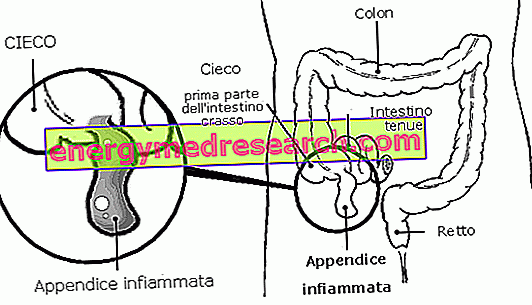What is a stomach ache?
The expression "stomach ache" is normally used - in common language - to indicate a generic intestinal pain. Along with stomachache, spleen pain and liver pain, a stomach ache is included in the list of the most common abdominal pains.

Common and pathological abdominal pain
No one has ever run away from a stomach ache: every person, at least once in their life, is actually affected. Fortunately, in the vast majority of cases, a stomach ache turns out to be a passing and fleeting pain, which spontaneously fades over a few hours or rapidly regresses through simple dietary-behavioral measures.
Despite what has been said, a stomach ache must not be underestimated: in some cases (fortunately in a minimal percentage), pain can hide a more or less serious pathology. In such circumstances, a stomach ache does not regress through simple pharmacological interventions, nor does it heal on its own. When the pain in the belly assumes a cramp-like connotation, it is acute, unstoppable, debilitating and difficult to localize, all that remains is to call for help immediately, since a serious inflammation such as appendicitis, pancreatitis or whatever may be in place.
In general, it is possible to distinguish an abdominal pain in two macro-categories: "common" abdominal pain and "pathological" abdominal pain. Although we are always dealing with a stomach ache, we will see that the causes of origin can be extremely different and varied; consequently, the requested therapeutic approach will be subordinated to the etiological factor (cause).
"Common" abdominal pain
In this chapter we will talk about common abdominal pain to indicate a form of abdominal pain that is not strictly pathological, and which can soon be solved by implementing simple natural, behavioral and pharmacological remedies.
But what can "common" stomach pain cause?
- Most of the times, stomach ache is due to GASTROINTESTINAL DISORDERS: in similar situations, abdominal pain is accompanied by other symptoms such as diarrhea, bloating (swollen belly), flatulence, dyspepsia (bad digestion), belching, nausea and vomiting. Bellyache is therefore part of a complex syndrome which, although annoying, is easily reversed by a simple cure, which clearly depends on the cause.
Did you know that ...
The term "gastrointestinal disorder" is rather generic, given that it includes numerous pathological forms. Among the gastrointestinal disorders most involved in the genesis of abdominal pain, we mention: irritable bowel syndrome, viral infections (eg chickenpox, S. Antonio fire, viral gastroenteritis), bacterial infections (supported, for example, by Salmonella, Staphylococcus aureus, Helicobacter pylori ), protozoan infections (eg giardiasis), traveler's diarrhea etc.
- In addition to being caused by gastrointestinal disorders, abdominal pain is a widespread pain phenomenon during MESTRUAZIONI . Dysmenorrhea, in fact, afflicts a good part of women during fertile age and, in this case, natural remedies can excellently relieve discomfort. The "cycle stomach ache" - as it is called in the jargon - is a temporary phenomenon that spontaneously vanishes as menstruation is resolved. However, it is possible to mask or alleviate abdominal pain with natural remedies (herbal tea with spasmolytic, relaxing and anti-inflammatory properties) or pharmacological (anti-inflammatory analgesic drugs such as ibuprofen and naproxen are the most indicated). For further information: read about remedies against menstrual pain or medications for painful menstruation
- A stomach ache can also be caused by a FOOD : a hearty meal - especially if it is rich in fat and "junk" food, accompanied by a mug of beer or a bottle of wine and perhaps concluded with a slice of dessert - can to favor an unpleasant sensation of gastric fullness, flanked by dyspepsia, nausea, flatulence, up to lead to a stomach ache. In similar circumstances, abdominal pain and all the related symptoms tend to disappear spontaneously the following day (although to promote digestion it is sometimes necessary to resort to some natural remedy for eupeptic-digestive action ...).
- Even the opposite phenomenon, or prolonged FASTING, may be the origin of the stomach ache: the remedy most indicated in such an occasion consists (clearly) in feeding oneself in a proper and correct way.
- Even the STRESS should not be underestimated: the hectic life, the anxieties and the everyday tensions can be the spark of chronic stomach ache. The solution, in this case, is to be found in the psyche: the subject suffering from stress-dependent stomach ache must try to relax, for example by dedicating himself to a sports activity or following specific yoga or pilates courses. Mood affects the genesis of stomach ache: many authors believe that smiling is good for the body and mind.
- In newborns, the GASEOUS COLICAS are the most frequent cause of abdominal pain. For the infant, the only way to show a stomach ache is to cry: during a gassy colic, the desperate and inconsolable crying crisis is explained by a strong and acute stomach ache. For further information: read the article on remedies for colic of the newborn
- Finally, but certainly not least, abdominal pain can also depend on FOOD INTOLERANCES . Among the most noteworthy, celiac disease (gluten intolerance) and lactose intolerance stands out. In similar situations, the intake (respectively) of foods able to form gluten in contact with water or milk / dairy products triggers, in response, a strong crampy and acute pain in the belly. The only solution to overcome stomach pain is, in this case, to remove all foods that may favor the disorder from the diet.



